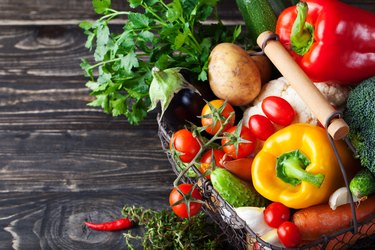
You look in your fridge and find a vegetable you bought a while ago but forgot about. Maybe you're wondering about that gross white slime on corn, or whether those black spots on cauliflower are safe to eat. In some cases, you might still be able to salvage the vegetables instead of trashing them.
Tip
Old vegetables will smell and taste terrible, but they’re only dangerous if they have mold or rot on them.
Video of the Day
Avoiding Spoilage if You Can
In a perfect world, you would never have to worry about whether food was safe to eat or not. Unfortunately, fruits and vegetables can go bad faster than you can use them. In fact, the average American family throws away a half-pound of produce a day because it has gone bad.
Video of the Day
You can control how quickly your fruits and vegetables stay good by being diligent about the way they're stored. The University of Arkansas Division of Agriculture recommends keeping greens and other vegetables that lose moisture quickly in the high-humidity crisper drawer of your fridge.
The low-humidity drawer is designed to release ethylene gases that promote faster rotting, so fruits that produce ethylene (apples, avocados, berries, etc.) should be stored here. All other products like bananas, sweet potatoes, potatoes and dry uncut onions should be stored at room temperature and never kept in the refrigerator.
Food Spoilage Vs. Pathogens
You'll know your food is spoiled because it looks, smells or tastes different from how it should. Although there will be exceptions, you don't have to worry if you accidentally eat spoiled food.
You might get sick from the smell or flavor, but the organism responsible for the spoilage won't cause a life-threatening infection, according to Michigan State University Extension. (Don't confuse this with pathogens like E.coli or noro virus — these will definitely make you sick, but you won't be able to see, taste or smell them.)
Some foods, including fruits and vegetables, will grow mold, which you don't want to eat. If you find your fruits and vegetables have mold growing on them, that doesn't necessarily mean you have to throw them out.
If it's a firm product, such as cabbage, bell peppers or carrots, you can cut off at least 1 inch around the mold spot and keep the non-moldy part. The low moisture content of these foods make it difficult for the mold to penetrate. However, if it's a soft fruit or vegetable like cucumbers, peaches or tomatoes, you should discard it.
Problems With Specific Vegetables
Some fruits and vegetables suffer very specific forms of spoilage. You might wonder whether the black spots on cauliflower are safe to eat. Cauliflower and other cruciferous vegetables are subject to developing black or brown spots caused by pathogens.
Because it's caused by a pathogen, you should assume those black spots on cauliflower are not safe to eat, but like mold, these black spots don't penetrate deep into the cauliflower, and minor ones can be cut off.
However, the California Department of Education emphasizes that significantly discolored cauliflower should be thrown out. Instead, look for cauliflower that is a creamy white color. The Mayo Clinic recommends not storing cauliflower in a cellophane bag because this will trap in moisture and promote rot.
If you find corn on the cob that's dried out or there's a white slime on the corn, these are the result of different fungi that can affect corn growth. Often, this will happen when the corn is growing in the field. In the case of corn on the cob that's dried out, this could have been affected by hot, dry conditions.
If it reaches the grocery store or farmers market without being detected, it could end up in your kitchen. Avoid eating corn on the cob that's been dried out, as well as white slime on corn, as these are signs of rot.
You're wise to be careful with fruits and vegetables that don't look, smell or taste their best. When in doubt, throw it out.
- Michigan State University: “Food Spoilage and Food Pathogens: What’s the Difference?”
- USDA: “Molds on Food: Are They Dangerous?”
- Ohio Veggie Disease News: “Alternaria Leaf Spot of Cauliflower”
- Mayo Clinic: “Cauliflower: The New Nutritional Superstar”
- University of Minnesota Extension: “Corn Ear Rots and Mycotoxins”
- California Department of Education: “Cauliflower Florets”
- University of Missouri Integrated Pest & Crop Management: “Ear and Kernel Rots of Corn”
- University of Arkansas Division of Agriculture: “Spoiled Rotten: How to Store Fruits and Vegetables”